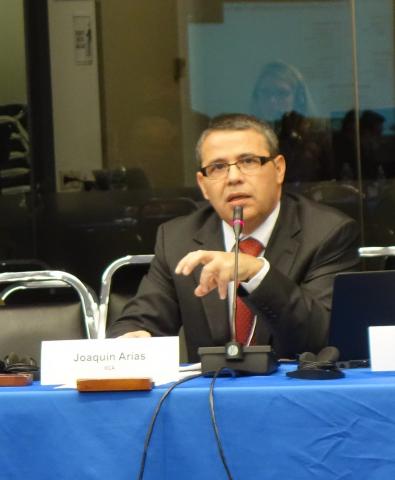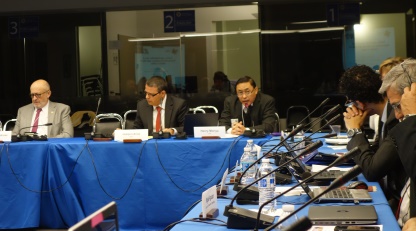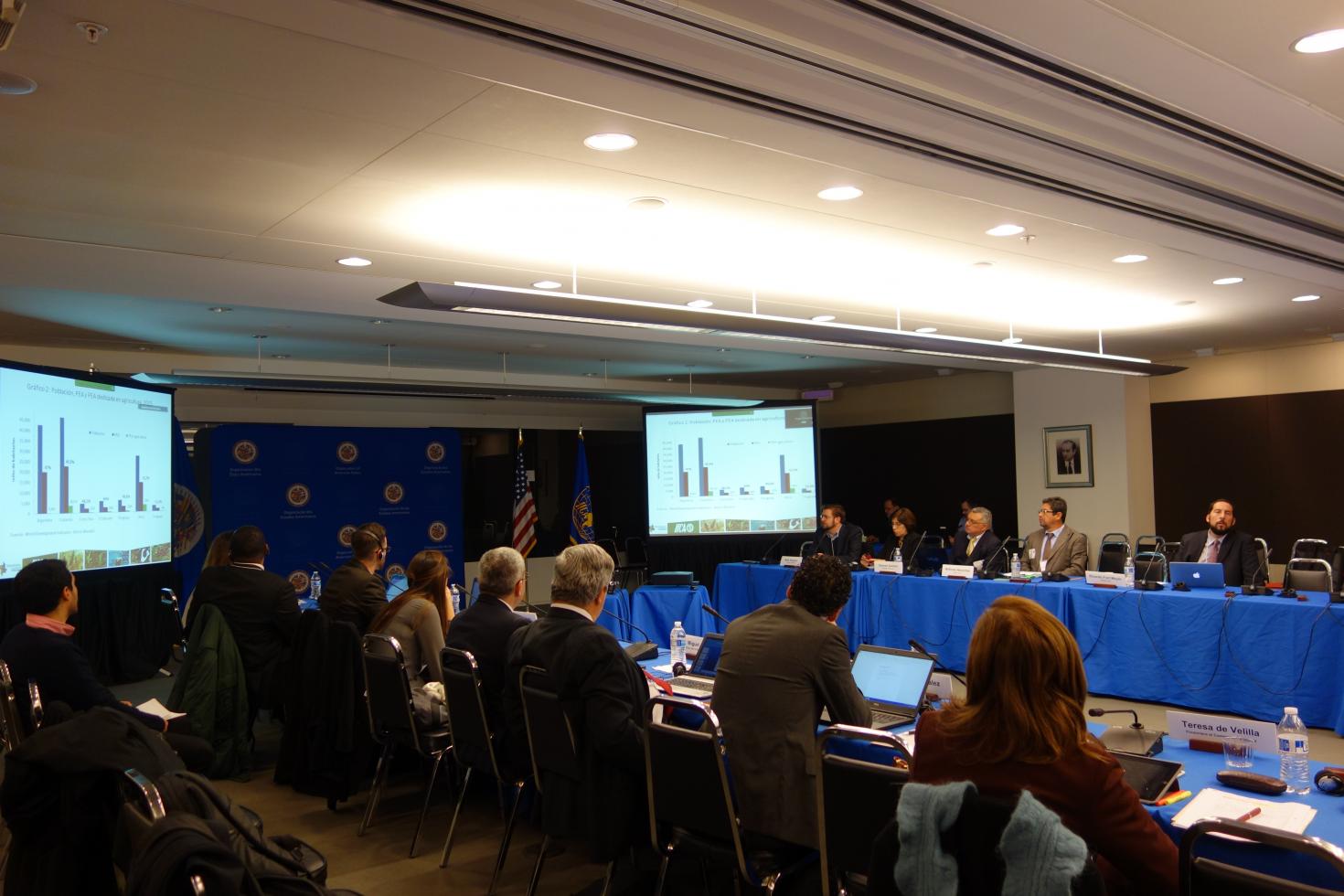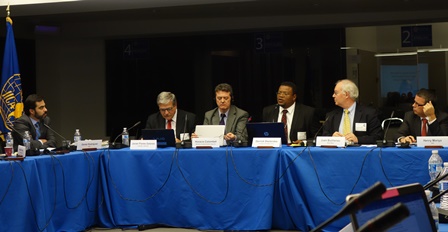This workshop was held to obtain input for a proposal that IICA is preparing on “public-private interventions designed to improve financing and financial inclusion in agricultural chains in LAC.

On December 7th, 2016, the Inter-American Institute for Cooperation on Agriculture (IICA) invited experts to a workshop to discuss the challenges and opportunities for financing agricultural value chains in Latin America and the Caribbean. This workshop was held to obtain input for a proposal that IICA is preparing on “public-private interventions designed to improve financing and financial inclusion in agricultural chains in Latin America and the Caribbean (LAC).”
The workshop comprised of five sessions.
The first session focused on the situation and macroeconomic context for financing agricultural value chains in LAC. Joaquin Arias, Policy and Sectoral Analyst from IICA provided background information about IICA’s technical project and the conceptual framework used for the analysis and promotion of agricultural value chain financing in Latin America and the Caribbean. Additionally, Henry Moriya, IICA consultant from Paraguay presented a summary of the countries’ business environment, as the context in which agricultural value chains operate.
During this session, participants addressed the issue of what specific policies and private actions can trigger a process in the selected value chains of Latina America (vegetables in Argentina, flowers in Paraguay, bovine meat in Uruguay, coffee in Peru, Cocoa in Colombia and Costa Rica and fruits in El Salvador) to break the vicious circle of financing and move to a virtuous circle where improved conditions of creditworthiness promote financing within the value chain. Also discussed was how better governance and greater coordination and integration among actors and enterprises along the value chain will set the stage for larger internal flows of financing, in the form of advance payments by buyers or exporters to producers, input providers offering fertilizer and pesticides on credit, factoring, and agricultural contracts, among others.

One of the concerns with the macro economic environment of countries in Latin America is the low penetration of credit in the economies and particularly in the agricultural sector. High interest rates and large differentials between passive and active interest rates and among sectors and countries, underlines the importance to understand the sources of variation of interest rates: rates of inflation, actual and perceived risks, operational costs, lack of competition and lack of proper regulations in the financial sector and structural demand issues (fragmentation, dispersion of actors, informality, rural infrastructure, etc.).
In the second session entitled “financing through agricultural value chains” the discussion focused on the opportunities, challenges, and proposals to enhance the intra-link financing of chains using instruments such as export contracts, input suppliers, factoring, leasing, certificates of deposit, etc. An interesting contribution was made by a speaker from France explaining a variety of instruments for generic, inter-firms, short, and long run financing like commercial papers, cash/liquidity loans and shares and bonds. He also explained the experience with partnership financing vertical integration contracts, intra-group financing and shares. Another valuable contribution was a research that shows the importance of farmer organizations and their linkages with enterprises along the value chain. Financing and income increase significantly when farmers are linked to firms in the value chain but the impact is twice as big when the farmer is connected to firms (input, processing, marketing, trade firms) through a producer organization.

Bank financing of agricultural value chains was the topic of the third session where experts focused on innovations, the level of penetration, determining conditions, factors responsible for their success, and the prospects for (short-, medium- and long-term) bank financing for agricultural chains in Latin America. The discussion continued on instruments such as guarantee funds, the development banking system, and the development or adoption of financial products like revolving funds, among others.
The services and non-financial products that promote financing in chains were also analyzed. One of the reasons explained by participants of why there is so low participation of banks in rural and agricultural financing is that producers, and in general actors in the value chains, are willing to borrow more money from other, more expensive, sources of financing in exchange for more simplicity, flexibility, less red tape, and timely credits. It is also a fact that there are information asymmetries that increase the transaction costs of credits. This explain why actors have little information about financial products available to them and financial institutions have little knowledge of the particularities of agricultural production and business, especially the differences between one production system and another and the life cycle of animals and plants. Information is either nonexistent, expensive to get, or of low quality to have a good assessment of the risks involved in agriculture.
During the fourth session, financing of agricultural value chains by non-banking financial institutions discussion was centered on ways to deal with the advances in the development and adoption of non-bank financing products and mechanisms such as microcredits, agricultural cooperatives, and investment funds. Many instruments were discussed as good possibilities for all countries and chains to adopt: investment fund in Uruguay and Colombia, public funded trusts in Argentina, alternative, ethical or social-oriented banks that operate in Peru and elsewhere like Shared Interest, Oikocredit, Root Capital and Alterfin. An important complement to this financial possibility where producer organizations, the bank and the importer or buyer are connected, is the guarantee funds like the Latin American Guarantee Fund (FOGAL) that operates in several countries in the Andean region. Guarantee funds are attractive because they lower interest rates, extend the term of the credits, establish the relation between the producer and the bank, and reduce the perception of risks by the financial system.

In the final session on public policies to improve agricultural value chain financing and inclusion experts took into account the information discussed in the previous sessions and inputs were generated for proposed public policies and private actions designed to promote the financing and financial inclusion of agricultural chains in LAC. A key take home message is that financial public policies must be complemented with non-financial support policies to the sector. An important challenge is to design state policies (long term, concerted policies) that integrate financial and non-financial policy instruments that do not distort market signals, and that promote public –private partnerships. A key role of the public sector is to provide sufficient and quality information to improve decision making based on science and to properly assess and manage risk, which in turn reduces the cost of financing. Also relevant, is is the role of governments to invest in physical and communication infrastructure in rural areas and to provide an adequate and efficient legal and regulatory framework for financing value chains. Since many ministries of agriculture do not have the jurisdiction to work beyond the primary sector of agriculture, they must work with other public institutions in order to have some influence on actors along the value chain, all the way to the final consumer.
The information gathered from the experts during the workshop will be used to contribute to the design of proposed public policies and private actions aimed at improving the financing and financial inclusion of agricultural chains in the region. A publication will be released next year to reflect these efforts.
For more information contact: joaquin.arias@iica.int
More information about this event: http://www.iica.int/en/events/challenges-and-opportunities-financing-agricultural-value-chains-latin-america
*The opinions expressed in this newsletter are those of the authors and they do not reflect the position of the Institute on the topics presented.
*This post appears in the IICA Delegation in the USA Newsletter – September – December 2016











